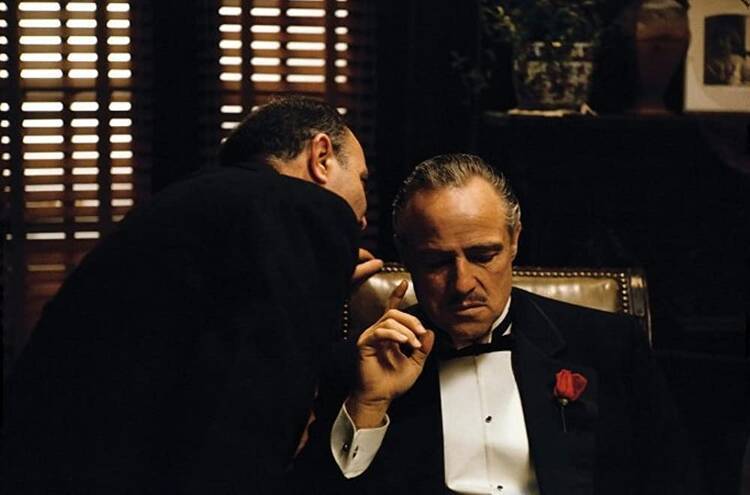I have a confession to make: before last week, I had never watched “The Godfather” all the way through.
I had seen bits and pieces before, not to mention the countless allusions and parodies in other films. But I have always carried the secret shame—especially as I’ve gained a reputation for being someone who knows something about movies—that I had never sat down and fully watched one of the defining American films.
So for the next three weeks in this column, I will cover Francis Ford Coppola’s famous trilogy one film at a time. Even if you have seen these movies a hundred times (and I would bet some of you have), I invite you to join me as I watch them with new eyes and engage with them through a Catholic lens. It’s an offer I hope you won’t refuse.
“The Godfather” (1972) is based on Mario Puzo’s novel of the same name (Puzo co-wrote the script with Coppola). Set in the 1940s, the film centers on the New York City-based Corleone crime family and their patriarch, Don Vito Corleone (played by Marlon Brando). His older sons—competent but libidinous Sonny (James Caan) and weak-willed Fredo (John Cazale)—are involved in the family business, but his youngest—war hero Michael (Al Pacino)—is trying to chart his own course. But when his father is nearly killed by his rivals, Michael embarks on a journey of revenge that will lead to him taking his father’s place as a mob boss.
I know a lot of guys (and it’s always guys) who seem to think “The Godfather” is an aspirational story, who quote lines about family, loyalty and respect like they are proverbs. It’s this, I believe, that gives the film a reputation for “glorifying” the Mafia. While Coppola certainly portrays the Corleones as wealthy, he doesn’t fixate on their lavish lifestyle (if anything, a Hollywood producer’s mansion is shot with more wealth-lust than the Corleone home). What really makes “The Godfather” an appealing fantasy is its seductive vision of power and its justifications.
Vito Corleone is so powerful that he rarely has to raise his voice above a murmur for his will to be done. He commands respect, but it’s a respect born from fear. In the film’s classic opening scene, Vito takes offense when a petitioner asks him to kill two men who attacked his daughter. It’s not because he is averse to violence, but because the petitioner talks to him like a criminal. It is only when he asks respectfully, using the Catholic title “Godfather” and kissing Vito’s ring, that the don acquiesces. When ordering his men to carry out the vendetta, the don cautions them not to get carried away: “We’re not murderers.”
Of course, they are murderers—and racketeers, extortionists and human traffickers. The reason the Corleones can and do consider themselves a class above other criminals is the veneer of class, respectability and pious Catholicism that belies the nastiness of their business. Every sinner creates justifications for his sins. Vito justifies the carnage caused by his business because he’s supporting his family, helping his community and following a personal code of ethics.
“The Godfather” suggests that this is how all power operates: a facade of respectability disguising the inherent violence that allows you to kill or buy—or both—your way to the top. By the end of the film, Michael surrenders to this cruel logic. When he compares his father to “any powerful man…like a president or senator,” his girlfriend Kay (Diane Keaton) calls him naive. “Presidents and senators don’t have men killed,” she says. Michael looks at her with pity. “Who’s being naive, Kay?”
If “The Godfather” presents a fantasy, it’s a dark one: power unrestricted by morality, wealth at any cost, respect that actually stems from mortal fear. The fact that audiences see the story as aspirational is more of a reflection on us as fallen people than the film itself. If anyone is glorifying the Mafia, it’s us.
“The Godfather” is streaming on Paramount+.








